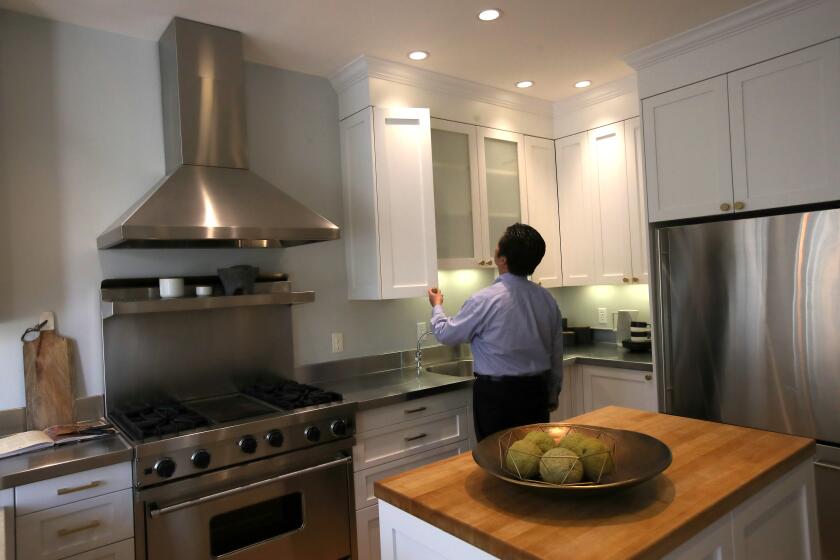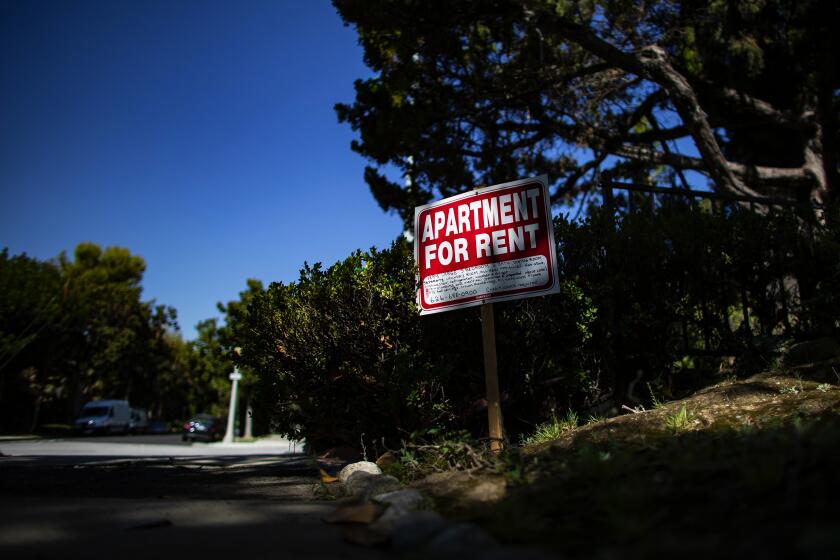Bringing down inflation might cause your rent to rise

- Share via
Britt and Danielle Vaughan have been renting an apartment in Pasadena since 2014. Earlier this year, the couple decided they were ready to fulfill their American dream of owning a home. Then they found out how much a loan would cost them.
“The mortgage rates went up pretty quickly and it didn’t make sense at all to buy a home,” said Vaughan, 36. In March, two weeks after the Federal Reserve announced its first interest rate hike in more than three years, they renewed their lease. “Thankfully, the landlord didn’t hike the rent for us and that made our decision easier,” he said.
In areas such as gas prices and food costs, the Fed appears to be gaining ground in its war on inflation, according to preliminary indicators. But in wielding the only weapon at its disposal, it may be exacerbating inflation on a key line of many household budgets: rent.
Since March, the Fed has raised interest rates twice more — by half a percentage point in May and three-quarters of a point in June. The rate hikes have driven mortgage prices even higher, leading people to postpone buying homes and look for rentals instead. In Southern California, the number of homes sold in June was down 25% year over year, according to data from DQNews. With a shortage of housing supply, that means higher inflation in rents.
Southern California’s median home sale price dropped to $750,000 in June, another sign that the ultra-competitive market is slowing down.
From here, economists say, it would take one of two things to tame rent inflation: the Fed raising rates even more to force a recession, or an increase in housing supply sufficient to match the rising demand.
“If you raise interest rates, people make do with their older cars, refrigerators or washing machines and postpone buying those goods. But, when it comes to shelter costs, it’s a bit trickier as people do need to live somewhere and you are pushing them from owner-occupied units into the rental market,” said Leo Feler, a senior economist at the UCLA Anderson School of Management.
Housing and rental costs have continued to rise steadily over the last few months, with rents increasing 5.8% in June from a year ago, the highest year-over-year jump since 1986. As the consumer price index mostly captures rents for existing leases rather than new ones, it tends to be a lagging indicator, meaning it probably has further to rise to reflect the current level of inflation.
Internal data maintained by the Bureau of Labor Statistics and reviewed by The Times showed that the average price of a new lease has increased more than 11% versus last year, more than double the rate of increase in existing leases.
Data collected by the U.S. Bureau of Labor Statistics -- but not made available to the public -- show a gulf between the market conditions affecting new versus renewing renters.
“Monetary policy works to slow inflation by hurting demand,” said Mark M. Zandi, chief economist at Moody’s Analytics. Tamping down demand for mortgages is straightforward, but the Fed’s actions “probably aren’t affecting demand for rent to a significant degree.”
Zandi expects acceleration in the official inflation data for rents to continue into 2023.
Data from the rental platform Apartment List show prospective renters are expecting to pay more for apartments. The budgets that users input when searching for properties on the site were up 9.3% year over year in June. That compares with a 7.7% increase in June 2021 and a 3.1% jump in June 2020.
“There are two possibilities why this is happening: Wealthier renters are entering the market, or user incomes are not changing, but they are adjusting their preferences on our website to account for the rising rent prices,” said Apartment List senior research associate Rob Warnock.
Experts disagreed about what it will take to bring rent inflation to heel.
Rick Palacios Jr., director of research at John Burns Real Estate Consulting, predicted that the Fed’s program of rate hikes will eventually have a moderating effect on rent, given enough time. “Raising interest rates has a unique way of permeating through the cracks of all asset classes and that’s what the Fed is trying to do,” Palacios said.
Any sort of economic downturn will hasten that process, especially a sharp one, he said. “No landlord would increase rents by 10% in a recession.”
Zandi said the most feasible solution is to increase the housing supply, arguing that private data already show current market rent growth peaking. “The number of homes under construction headed towards completion is pretty close to a record high and we should see more multifamily units being completed with the pandemic labor problems fading away,” Zandi said.
But Feler disagreed, saying builders would prefer not to build additional housing when mortgage prices are going up.
During the pandemic, he said, the average size of households came down as remote work became the norm and workers sought dwellings with more privacy and office space.
That trend will reverse itself, he predicted, as an economic slowdown forces laid-off workers to go back to living with family members or roommates, as occurred after the economic crisis of 2008-09.
“The Fed will only get shelter costs under control through higher unemployment,” Feler said, “and that usually means recession.”
Getting your first apartment is a big deal, and in Los Angeles, it can be a big pain. Here are tips for navigating the process — from searching for openings to touring units to signing the lease.
More to Read
Inside the business of entertainment
The Wide Shot brings you news, analysis and insights on everything from streaming wars to production — and what it all means for the future.
You may occasionally receive promotional content from the Los Angeles Times.














